
Parenting or child rearing promotes and supports the physical, emotional, social, spiritual and cognitive development of a child from infancy to adulthood. Parenting refers to the intricacies of raising a child and not exclusively for a biological relationship.
A form of child abuse, child neglect is an act of caregivers that results in depriving a child of their basic needs, such as the failure to provide adequate supervision, health care, clothing, or housing, as well as other physical, emotional, social, educational, and safety needs. All societies have established that there are necessary behaviours a caregiver must provide for a child to develop physically, socially, and emotionally. Causes of neglect may result from several parenting problems including mental disorders, unplanned pregnancy, substance use disorder, unemployment, over employment, domestic violence, and, in special cases, poverty.

Franco-Columbians are French Canadians or Canadian francophones living in the province of British Columbia. According to the 2016 Canadian Census, 71,705 residents of the province stated that French is their mother tongue. In the same census, 388,815 British Columbians claimed full or partial French ancestry.
North Island College (NIC) North Island College (NIC), is a community college located primarily on Vancouver Island, British Columbia, Canada.
Family literacy is a method of education. Relatively new, family literacy is being put into practice in the United States, Canada, and South Africa.
Emergency Support Services (ESS) is a component of Emergency Management British Columbia. As of March 2023, EMBC became part of the B.C. Ministry of Emergency Management and Climate Readiness ESS are those services required to preserve the well-being of people affected by an emergency or disaster. Teams are established in local municipalities and assemble together for meetings and contingency planning.

British Columbia Children's Hospital is a medical facility located in Vancouver, British Columbia, and is an agency of the Provincial Health Services Authority. It specializes in health care for patients from birth to 16 years of age. It is also a teaching and research facility for children's medicine. The hospital includes the Sunny Hill Health Centre, which provides specialized services to children and youth with developmental disabilities aged birth to 18 years.
The First Peoples' Cultural Council (FPCC) is a First Nations governed Crown Corporation of the province of British Columbia, Canada. It is based in Brentwood Bay, British Columbia on Tsartlip First Nation. The organization was formerly known as the First Peoples' Heritage, Language and Culture Council, but shortened its name in 2012.
The Australian National Council on Drugs (ANCD) describes itself as "the principal advisory body to Government on drug policy and plays a critical role in ensuring the voice of the community is heard in relation to drug related policies and strategies." The Council occupies a unique position by virtue of its role in enhancing the partnership between the government and the community. It has pivotal advisory, advocacy and representative functions, with a significant role to provide government Ministers with independent, expert advice on matters related to licit and illicit drugs.
Early Head Start is a federally funded community-based program for low-income families with pregnant women, infants, and toddlers up to age 3. It is a program that came out of Head Start. The program was designed in 1994 by an Advisory Committee on Services for Families with Infants and Toddlers formed by the Secretary of Health and Human Services. "In addition to providing or linking families with needed services—medical, mental health, nutrition, and education—Early Head Start can provide a place for children to experience consistent, nurturing relationships and stable, ongoing routines."
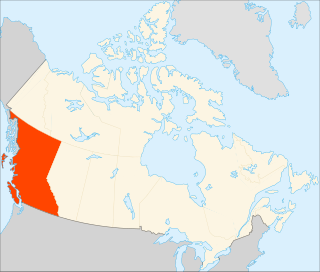
Higher education in British Columbia is delivered by 25 publicly funded institutions that are composed of eleven universities, eleven colleges, and three institutes. This is in addition to three private universities, five private colleges, and six theological colleges. There are also an extensive number of private career institutes and colleges. Over 297,000 students were enrolled in post-secondary institutions in British Columbia in the 2019-2020 academic year.
Family resource programs (FRP) are Canadian community-based organizations that intend to support families in a variety of ways through systems such as family resource centers, family places, family centers, and neighborhood houses. They can also be linked to schools, community centers, child care programs, women's centers, and native friendship centers. This includes programs such as Ontario Early Years and military-funded family centers. They are generally grassroots organizations that aim to be responsive to local issues.
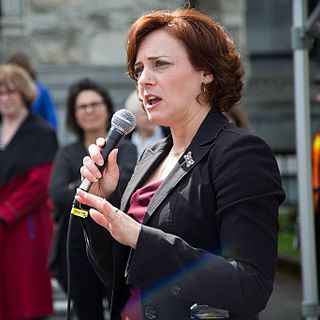
Michelle Mungall is a Canadian politician, who represented the Nelson-Creston electoral district Legislative Assembly of British Columbia from 2009 to 2020. She is a member of the British Columbia New Democratic Party and was first elected as a Member of the Legislative Assembly in the 2009 election and re-elected in the 2013 and 2017 elections. During the 41st Parliament (2017-2020) she served in the Executive Council as the Minister for Energy, Mines and Petroleum Resources, and for several months in 2020 as the Minister of Jobs, Economic Development and Competitiveness. In the ministerial role she led the government through adopting the Zero- Emission Vehicles Act to require that by the year 2040 all new light-duty vehicle sales in BC must be zero-emission vehicles. She also led the government through amending several energy, mines and petroleum resource-related acts, including implementing recommendations from a comprehensive review of BC Hydro.
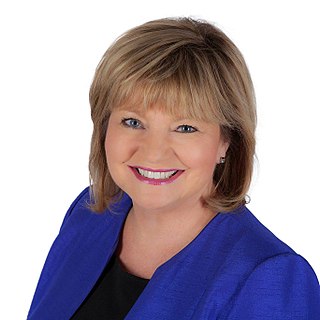
Jane Ann Thornthwaite is a Canadian politician, who represented the North Vancouver-Seymour electoral district Legislative Assembly of British Columbia from 2009 to 2020. She is a member of the British Columbia Liberal Party and was first elected as a Member of the Legislative Assembly in the 2009 election and re-elected in the 2013 and 2017 elections. Her party formed a majority government during the 39th and 40th Parliaments during which she was appointed to be Parliamentary Secretary for Student Support and Parent Engagement (2012–17). Her party briefly formed a minority government in the 41st Parliament during which she was appointed as the Parliamentary Secretary for Child Mental Health and Anti-Bullying (2017) but became the critic for issues relating to Mental Health and Addictions when she became part of the official opposition.
The Family Movement, also known in the past as the Parent Movement, is an arm of the disability rights movement, a larger social movement. The Family Movement advocates for the economic and social rights of family members with a disability. Key elements include: social inclusion; active participation; a life of meaning; safety; economic security; accessibility and self-determination. The family movement has been critical in closing institutions and other segregated facilities; promoting inclusive education; reforming adult guardianship to the current supported decisionmaking; increasing access to health care; developing real jobs; fighting stereotypes and reducing discrimination.

Nurse-Family Partnership (NFP) is a non-profit organization operating in the United States that connects mothers pregnant with their first child with registered nurses, who provide home visits until the child's second birthday. NFP intervention has been associated with improvements in maternal health, child health, and economic security.
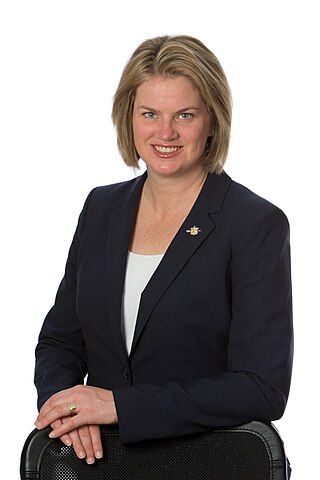
Jennifer Rice is a Canadian politician, who was elected to the Legislative Assembly of British Columbia to represent the electoral district of North Coast. She is a member of the BC New Democratic Party. Rice was first elected as a member of legislative assembly (MLA) in the 2013 provincial election and was re-elected in the 2017 election. In the 40th Parliament of British Columbia she acted as the official opposition's critic for northern and rural economic development and deputy critic for children and family development and introduced one private member bill, the Drinking Water Protection Amendment Act regarding regularizing testing of drinking water in schools.

Melanie Joy Mark, also known by her Nisga'a name Hli Haykwhl Ẃii Xsgaak, is a Canadian politician in the province of British Columbia. A member of the New Democratic Party (NDP), she served as the Member of the Legislative Assembly (MLA) for Vancouver-Mount Pleasant from 2016 to 2023. From 2017 to 2020, she served as Minister of Advanced Education and Skills Training; from 2020 to 2022, she served as Minister of Tourism, Arts, Culture and Sport. Mark is the first First Nations woman elected to the Legislative Assembly of British Columbia, and the first First Nations woman to serve in the Cabinet of British Columbia. On February 22, 2023, Mark announced her intention to resign as MLA and cabinet minister, her resignation took effect April 14 of the same year.
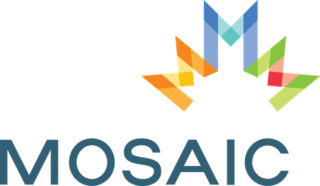
Multi-lingual Orientation Service Association for Immigrant Communities, primarily called MOSAIC, sometimes called MOSAIC BC, is a Vancouver based not for profit organization that supports immigrants and refugees to resettle in Vancouver.
Carrier Sekani Family Services (CSFS) is an indigenous-led organization in British Columbia, Canada providing health, child welfare and other services to member nations of the Carrier Sekani Tribal Council, plus some other nations that speak the Carrier or Sekani languages, mostly in north central British Columbia. In 2020 they celebrated 30 years of work reasserting First Nations control of justice, health, social and family services.









